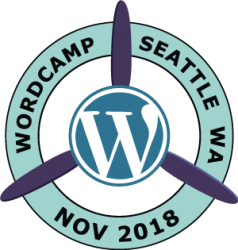Let’s explore the benefits of thinking in reusable blocks. Atomic design, Modular Development, and D.R.Y. methodology improves productivity, enhances UI and empowers authors. We will explore multiple methods to achieve modularity in our WP themes. Leveraging the WordPress templating system and Advanced Custom Fields or Using blocks in the form of Gutenberg. Regardless of if you are ready to learn Javascript deeply and embrace Gutenberg or set in your ways and sticking with the classic editor. You will leave this talk excited and ready to integrate this strategy into your workflow.
Embracing Gutenberg in Existing Code
Gutenberg is a major change to how you will develop software for WordPress. It starts with the WordPress editor but is planned to slowly take over the entire admin interface.
If you already have existing plugin or theme code that you need to maintain and make ready for the upcoming Gutenberg update, you will probably face some architectural design challenges.
This talk will first provide an overview of the general concepts that govern development in the Gutenberg era, and then discuss the different tricks & techniques you can use to gradually move your existing code from here to there, in a clean transition.
How to Clean the WordPress Database
Is your website running slowly? If you’ve had a WordPress site for a few years, it could be the MySQL database—the silent killer of WordPress performance. The database can be the biggest drain on WordPress speed and stability but for many of us, it’s the most intimidating part to address, which can leave sites bloated, expensive, and ready to crash under high traffic.
But it’s actually not that scary. Using WordPress plugins and phpMyAdmin, we’ll build the skills to diagnose database issues, go over some common problems and a few weird edge cases from abandoned plugin data to blog imports gone wrong, and learn how to safely fix and maintain the database for top performance.
Shipping Content With WP-CLI and Automated Testing And Why That Is Awesome
We live in a world of continuous integration, continuous delivery, version controlled code and configuration. Yet when it comes to delivering content we are relying on doing all publishing straight to the production environment and hoping it works, editing the live document to fix issues we only find once they are in production. I propose there is a better way.
Let’s build our content on our development instances the same way we develop code and configuration. Then using the power of Github, WP-CLI and Automated Testing tools like Behat, let’s professionally deploy our content to production will full confidence it works as intended. Let’s give editors better tools to build better content in a word of Gutenberg while saving anyone the need to overwrite the production database ever again.
Topics include:
- WP-CLI for generating content
- Connecting Github and your WordPress site
- Leveraging multiple environments
- Behaviorally testing content
What is Caching?
Caching is critical to the functioning of the modern web. From CDNs to browser caching to DNS TTLs to the WordPress object and full page cache, caching can be a confusing and challenging topic. With Google emphasizing site performance in the latest page rank algorithm changes, it is a topic we can’t afford to ignore. This talk will explain caching in layman terms (with some power-user pro-tips sprinkled throughout) and will give actionable advice on how to make caching work for any site. We will cover the tools available and how to use them effectively and where it might be worth spending money to get better results.
Intro to ADA Development
Best way to be ADA compliant, or to show a level of compliance? Do it from the start. If you’re trying to be compliant after the fact, you could be in for a world of hurt.
In this discussion, we’ll go through a framework, active development, and how many things you could easily be doing during workflow from the start to make your website more accessible!
This doesn’t have to be hard! We are an open-source community, so let’s get everyone up to speed on how we can make our sites even more accessible.
The other WPML: Machine Learning / Ai in WordPress
The growth of API-based Machine Learning has finally brought Ai into the hands of WP Developers: with just a few lines of PHP, we can now do impressively complicated tasks — from automatically detecting if an uploaded photo is Safe For Work, to predicting which products a shopper might enjoy, to smart bot chat sessions. In this session, we’ll take a look at the landscape of ML Services which can be accessed by Plugin & Theme Developers, consider which aspects make specific APIs easy or difficult to use, and see a live implementation of an Ai-based plugin.
The Benefits of Testing and Automation
Modern development is complex, with lots of tools to turn the code we write into the code used by the user’s browser. This can be as simple as minifying assets or as sophisticated as downloading dependencies, turning source code into production code, and running automated tests.
In this session, we will look at the top benefits gained from adopting automation and testing to optimize workflow. Whether you’re a developer wondering why you should try automation in the first place or a business owner wondering why you should let your team spend time on adopting a new process when the current one “just works” we’ll have answers for you!
